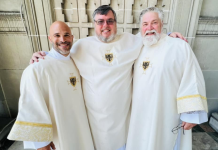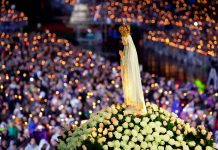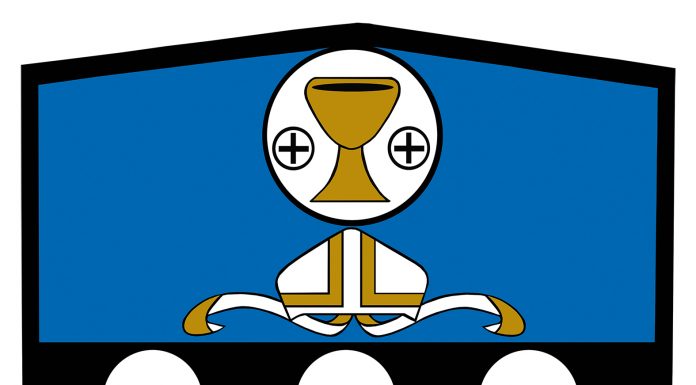Column by Jonathan Nagy
Over 2000 years ago, lowly shepherds tended to their sheep in the hills surrounding the poor village of Bethlehem. In an instant, these men, who were minding their own business, were enveloped in glorious light and the resplendent presence of angels, who relayed to them that the Savior had been born. These shepherds, inspired by this awesome revelation, made their way to the manger, where they found the Holy Family in the most deplorable of conditions. Nothing about that evening was fit for the birth of the Lord, and yet, at the same time, it was perfect.
A favorite Christmas memory that I get to relive each year is trudging out of my house in the middle of a dark, cold winter night, driving to the Basilica of Saint Michael the Archangel, and attempting to keep myself awake for Midnight Mass. Long after my bedtime and fighting coherence, I prepare myself and the Basilica choir to begin singing. The darkened church, lit only by the lights on the Christmas trees, creates a solemn, quiet, comforting setting. Mass begins in darkness with the chanted proclamation and blessing of the manger. I imagine the quiet stillness that beholds the Basilica was similar to that which beheld the shepherds in the fields, as is the subsequent event. The lights are raised, I begin playing the majestic organ, and the choir leads the singing of “O Come All Ye Faithful,” awakening the hearts and souls of all within the church. In the middle of this grand setting, it is hard to imagine that Christmas in Loretto would have ever been celebrated any differently, but quite the opposite is true.
In the fall of 1799, Father Demetrius Gallitzin led the construction of a log cabin church on the adjacent hillside to the current Basilica. He employed the entire town, men, women, and children, to take part in construction of the only Catholic church between Lancaster and Saint Louis. The church was completed just in time for Father Gallitzin to celebrate Midnight Mass on Christmas.
Sarah Brownson, in her 1873 book, Life of Demetrius Augustine Gallitzin, Prince and Priest, vividly describes the setting surrounding that new church on Christmas Eve, 1799:
The snow lay waist-deep beside it, and far as the eye could reach around it; the stars shone over it bright, and cold, and pure, as on that other December night over the scarcely poorer stable at Bethlehem. He had instructed the men to bring in branches of the beautiful evergreen trees, which grew thick upon the mountains and at their very doors, the women set their candles amongst the dark green foliage, covering the rude walls, and just at midnight, when the people who had gathered from immense distances through the wilderness of snow, were hushed in wrapt expectation, he came out upon the altar, with all the ceremony of the grandest cathedral, and intoned the Mass…
Father Gallitzin was reputedly a fantastic singer in addition to being an accomplished violinist. It is reasonable to assume that flowing from his lips as well as from his violin, came the same tune that we currently sing to open Midnight Mass. In the darkness of that small, crude, church, lit only by the candles and lanterns, it is easy to imagine that echoes of Adestes Fideles were heard by all in attendance.
Just like the clientele at the birth of Jesus, the attendees at the first Midnight Mass in Loretto were not high class socialites. The church was filled with local Catholic families, consisting of hunters, trappers, and other woodsmen, in addition to unevangelized farmers and other non-Catholics. Their clothes, made out of the hides of the animals they hunted and not fancy by any stretch of the imagination, kept them warm on that bitterly cold winter’s night.
Sarah Brownson went on to describe more about that first Mass, writing,
The attendees looked on in mute amazement, not unlike the dumb creatures at Bethlehem, only vaguely surmising something in themselves not known before, until the priest turning announced in stirring, ringing words, that God had come to his people, that the heavens had opened and rained down the Just One; that earth was his cradle, our hearts his resting place, and thus battered down the thrice plated iron doors of ignorance, poured sudden light into the close and swarming cavern of the flesh, and showed a soiled and starving soul, shivering, trembling, crouching with wild, terrified, hungry eyes, in its farthest corner,; a soul the Child had come to cleanse, to dress, to adorn, to give food and nourishment, to raise to its feet, with head erect, strong and comely before the eyes of angels and of men.
Venite adoremus Dominum!
How wonderful it is to picture that powerful scene which lit the fire that became our local church, that is greatly celebrated in our current Basilica, and how amazingly similar the setting was that night in 1799 to the one long ago in Bethlehem! Both the current Midnight Mass and the first one 234 years ago are perfect celebrations of the birth of Christ, while still existing as completely different situations.
The true spirit of Christmas permeates the receptive soul. Saint Thomas Aquinas wrote, “A Child is born to us, that we might imitate His purity and humility, that we might be attracted by His lovableness, and that we might have confidence in His mercy.” What gifts did the Christ Child bring to each of us? The gifts of purity, humility, and mercy. Taking Aquinas’ cue, we can see that the meaning and purpose of Christmas really is as simple as was the setting of Jesus’ birth.
One of my favorite pieces from Georg Friedrich Handel’s magnificent The Messiah¸ is And He Shall Purify, taken from Malachi 3:3. Handel felt that in his musical journey of Christ, this was an important verse to include prior to the announcement of the birth. While I love the dynamics of the piece, the words are simple and clear: “And He shall purify the sons of Levi, that they may offer unto the Lord an offering in righteousness.” God was made man to offer us cleansing purity in order to enter the kingdom of Heaven.
Humility and humbleness are often used interchangeably, and while both are important, the gift of humility from Jesus is important to highlight. Both words refer to being modest, but humility exemplifies having a modest opinion of oneself. Jesus grew up knowing that He was the Son of God, and yet He kept humility about Himself. Human beings are very quick to brag about any accomplishment they achieve, no matter how large or small. We can learn a lot from this gift, learning to “die to oneself” in Jesus’ name.
The gift of mercy is a gift that keeps on giving. The dictionary definition of mercy is, “compassion or forgiveness shown toward someone whom it is within one’s power to punish or harm.” That gives so much context to what God does for us when we seek Him out. Time and time again, we falter and fail, and time and time again, He forgives us. He doesn’t want to punish us. God wants us to be with Him, for we are made in His image and likeness.
All three of these gifts were present at that first Christmas in Bethlehem, as well as the first Christmas in Loretto. Father Gallitzin came to purify the people, offering the sacraments and providing them with a path home to the Father in Heaven. The humility of Father Gallitzin, renouncing his royal inheritance and even for a while, his name, demonstrates that the cause of Jesus was more important to him than any earthly honors. Finally, the mercy that Gallitzin showed to the people of the Allegheny Mountains that first Christmas and throughout his life brought many to the Church and the love of Jesus Christ.
We can and must continue this legacy Christmas message today. As the settings have changed for Christmas over the years, the true meaning has remained the same. Writing In Philippians 2:3-11, Saint Paul explains what the gift and purpose of “God Made Man” is for all of us: “Do nothing from selfishness or empty conceit, but with humility consider one another as more important than yourselves; do not merely look out for your own personal interests, but also for the interests of others. Have this attitude in yourselves which was also in Christ Jesus, who, as He already existed in the form of God, did not consider equality with God something to be grasped, but emptied Himself by taking the form of a bond-servant and being born in the likeness of men. And being found in appearance as a man, He humbled Himself by becoming obedient to the point of death: death on a cross. For this reason also God highly exalted Him, and bestowed on Him the name which is above every name, so that at the name of Jesus, every knee will bow, of those who are in heaven and on earth and under the earth, and that every tongue will confess that Jesus Christ is Lord, to the glory of God the Father.”
As the shepherds of Bethlehem did 2000 years ago, and Father Demetrius Gallitzin 234 years ago, let us exalt the almighty power of God and recognize the gift that He gave us by becoming like us. Never forget the gifts given to us at the manger that are continually given to us daily. O come let us adore Him, Christ the Lord!
Jonathan Nagy, M.Ed., is the Dean of Students and Social Studies teacher at Bishop Carroll Catholic High School in Ebensburg. He is also the Music Director at the Basilica of Saint Michael the Archangel in Loretto.





























